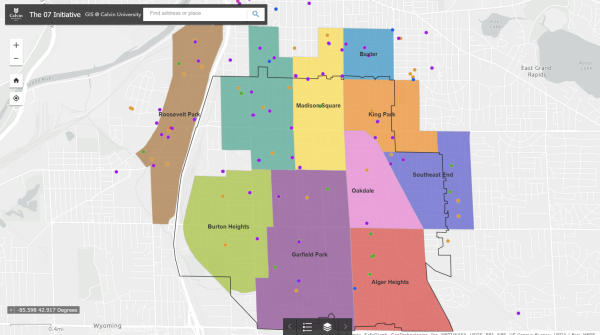This week in Lansing
The Michigan Senate and House have adjourned for two weeks, until April 18 and 19 respectively. In the meantime, bills and resolutions are in various stages making their way through the process of introduction, committee approval, and floor vote.
Introduced in the House:
“Good jobs” package — SB 242 — passed by Senate, currently in House committee
A bipartisan package of bills called Good Jobs for Michigan hopes to attract businesses to the state by offering tax incentives for businesses to create “good” Michigan jobs. Under the legislation, up to 15 companies would be eligible each year to collect and keep between 50 and 100 percent of their employees’ withheld income tax if they meet certain job-creating qualifications. The qualifications include a high number of jobs created, and qualifying companies must pay their employees at a rate above the average wage for the region. This average wage could be between $18.57 and $27.77 per hour depending on which area of Michigan the company is located in. Good Jobs Michigan is the coalition backing the legislation, arguing that the bill will make Michigan competitive and incentivize strong businesses to move to the state. One opposition voice, Ron Bieber, president of the Michigan AFL-CIO, said of the bill, “The idea that a worker would pay their income taxes directly to their employer to subsidize their own salary is just nuts.” The Senate passed SB 242 last week, and the bill is currently in a House committee for review.
Death With Dignity Act — HB 4461
A “Death with Dignity Act” legalizing physician-assisted suicide in the state of Michigan was introduced on March 30 in the State House. Sponsored by state representatives Tom Cochran and Pam Faris, the bill would put in place regulations “to require safeguards for determining that the patient has a terminal disease, receives adequate counseling, and makes a voluntary request for medication.” “Death with Dignity Acts” are in place in five states: Oregon, California, Colorado, Washington, and Vermont. Cochran and Rep. Sam Singh introduced a similar bill last summer.
Making it easier for Michigan parents to waive vaccinations — HB 4425
Introduced March 28, HB 4425 would undo relatively new regulations that made it more difficult for parents to forgo vaccination for their children. Rep. Tom Barrett, R-Potterville, the bill’s sponsor, and Sen. Patrick Colbeck, R-Canton, sponsor of sister bills in the Senate, both argue that the Michigan Department of Health and Human Services overstepped their authority when they enacted more strict rules regarding vaccine waivers. The rules, implemented January 2015, required those seeking waivers to receive education about vaccines from a health professional and sign a state form acknowledging that they put other children in danger by opting not to vaccinate their children. The bills introduced in the House and Senate would retract those additional requirements and prevent the department from prohibiting unvaccinated children from groups or activities.
More bills introduced:
HB 4120 and 4124-4125: Water sources for public schools must be tested for lead and other contaminants.
HB 4430: Protecting Michigan residents from the federal government collecting data without a warrant.
HB 4130: Businesses contracting with the state must verify that their employees are legal residents.
HB 4142: Teacher Shortage Prevention Act.
In the Senate:
Freedom of Information Act package — HB 4148-4157 — passed by House, in Senate committee
In Michigan, the governor and the state legislature are not subject to Freedom of Information Act (FOIA) open records laws–and Michigan is just one of two states in the country where this exemption remains. Lawmakers moved to change that in mid-March with a package of bills that would apply the Freedom of Information Act to the governor and legislature broadly. The House voted unanimously to pass the bills, which are now up for Senate committee review. Michigan consistently ranks among the lowest in the nation for transparency and government accountability; a 2015 corruptibility report card from the Center for Public Integrity, for example, ranked Michigan worst in the country in terms of Michigan’s transparency and accountability practices. The state government’s lack of transparency law surfaced during the Flint water crisis, when, although Governor Rick Snyder released some of his emails, the difficulty of investigating the internal workings of state government became apparent, and bipartisan transparency efforts grew. Though the bills had unanimous support in the House, they still face the obstacle of Senate majority leader Arlan Meekhof, who killed a similar transparency bill passed by the House last year.
Requiring presidential candidates to disclose tax returns to appear on Michigan ballot — SB 216 — in Senate committee
A bill introduced in March would require, as a prerequisite for appearing on the Michigan ballot, that presidential candidates disclose the last five years of their tax returns. Sen. Steve Bieda, D-Warren, primary sponsor of the bill, reasoned that “the citizens of Michigan and the American people deserve to know what potential conflicts of interest a presidential candidate and their running mate have … the Office of the President is not a private business, it is an office of public service.” Maryland, California, New York, and several other states have introduced similar bills. The bill would require that presidential candidates give their income tax returns to the Secretary of State, who would then release the information to the public at least 30 days before election day. Though the bill clearly hits a sore spot for Democrats in the wake of President Trump’s refusal to disclose his tax returns during his campaign (and after), Bieda hopes to appeal to the bipartisan support for transparency that a set of House Freedom of Information Act bills received two weeks ago.
Legalize switchblades — SB 245 — approved by committee, up for Senate vote
Senator Rick Jones’s bill to legalize switchblade knives in Michigan garnered the approval of the Senate Judiciary committee last week and is headed to the Senate floor for a vote. Currently the knives are illegal under the Michigan Penal Code, which regards switchblades as knives that open with mechanical assistance. A representative of the Michigan State Police told the Grand Rapids Press that “we have absolutely no problem with the repeal” of the ban on switchblades, citing that the ban is not upheld throughout the state as it stands.
Remove sales tax for feminine hygiene products — SB 91-92 — Passed committee, up for Senate vote
As it stands, tampons and pads are categorized as “luxury” items for tax purposes. A bill that has won committee approval in the Michigan Senate would change the tax categorization of feminine hygiene products to make them exempt from sales tax and use tax, eliminating what has been called the “tampon tax.” Senator David Knezek, D-Dearborn Heights, and Senator Rebekah Warren, D-Ann Arbor, introduced the legislation, and Rep. Winnie Brinks, D-Grand Rapids, is a sponsor of a sister bill in the House. Currently, eight states have exempted feminine hygiene products from their sales tax, besides the five states that do not levy a sales tax at all.
Other bills introduced in the Senate:
SB 83: Make civil rights records part of Freedom of Information Act disclosure requirements.
SB 84: Homeless Bill of Rights.
SB 93: Require academic credit for internships.
SB 98: Increase the number of authorities who can designate promise zones. Promise zones are “local public-private partnerships that aim to make college free for every high school graduate to at least one institution for at least two years” in impoverished areas of the state, according to the Campaign for Free College Tuition.







